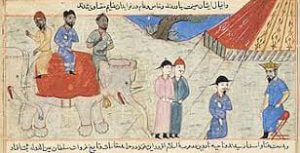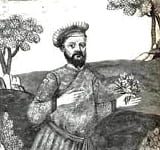Abdul Latif | Mirat-i-Ahmadi | A Review. Explore a compelling review of Abdul Latif’s Mirat-i-Ahmadi—a powerful historical work that illuminates the rich heritage and significant events of the region, captivating readers with its depth and insight.
Abdul Latif’s ‘Mirat-i-Ahmadi’-A Review
One of the key features of ‘Mirat-i-Ahmadi’ is its detailed descriptions of the lives of the Mughal emperors. Abdul Latif provides a wealth of information on the personal lives of the emperors, their habits, hobbies, and interests. The author also discusses the court politics and power struggles that took place during the reigns of the Mughal emperors. The book is particularly valuable in providing a window into the lives of the people who lived during the Mughal period.
The author also provides detailed information on the military campaigns of the Mughal emperors. The book provides a detailed account of the various battles fought by the Mughals, including their strategies, tactics, and weaponry. The author’s descriptions of the battles are often vivid and detailed, and he provides a fascinating insight into the military practices of the time.
Another important feature of ‘Mirat-i-Ahmadi’ is its discussion of social and cultural practices of the Mughal Empire. The book provides a detailed account of the social customs and traditions of the Mughal era, including clothing, food, music, and dance. The author also discusses the role of women in Mughal society and provides insight into the cultural practices of the time.
The book is also valuable in providing a comprehensive overview of the administration of the Mughal Empire. Abdul Latif discusses the structure of the Mughal administration and the various administrative posts that existed in the empire. He also provides a detailed account of the taxation system and the methods used to collect revenue.
One of the key strengths of ‘Mirat-i-Ahmadi’ is the author’s writing style. Abdul Latif’s prose is clear and concise, and his descriptions are often vivid and engaging. He has a knack for telling a good story, and the book is an enjoyable read.
However, the book is not without its flaws. Some readers may find the book to be overly detailed, and the author’s descriptions of battles and military campaigns can be dry and tedious at times. Additionally, the book is written in a style that may be difficult for modern readers to follow, as it uses a language and style that are typical of the 17th century.
In conclusion, ‘Mirat-i-Ahmadi‘ is an important historical text that provides a comprehensive account of the Mughal Empire in India. The book is a valuable resource for those interested in the history of India and the Mughal Empire, and it provides a wealth of information on a wide range of topics. Despite its flaws, the book is an enjoyable read, and it is well worth the effort for those who want to gain a better understanding of the history and culture of India. 0 0 0.
Abdul Latif | Mirat-i-Ahmadi | A Review
N.B. The article originally belongs to the book entitled ‘Reviews of Some Iconic Travelogues‘ by Menonim Menonimus.
Books of Literary Criticism by M. Menonimus:
- World Short Story Criticism
- World Poetry Criticism
- World Drama Criticism
- World Novel Criticism
- World Essay Criticism
- Indian English Poetry Criticism
- Indian English Poets and Poetry Chief Features
- Emily Dickinson’s Poetry-A Thematic Study
- Walt Whitman’s Poetry-A Thematic Study
- Critical Essays on English Poetry
- Tawfiq al-Hakim’s Novel: Return of the Spirit-An Analytical Study
- Tawfiq al-Hakim’s Novel: ‘Yawmiyyat Naib Fil Arayaf’-An Analytical Study
- Analytical Studies of Some Arabic Short Stories
- A Brief History of Arabic Literature: Pre-Islamic Period (500 AD-622 AD)
- A Brief History of Arabic Literature: Early Islamic Period (622 AD-661 AD)
- Reviews on William Shakespeare’s Works
- Reviews of John Milton’s Literary Works
- Reviews of Some Iconic Travelogues …
Additional Searches:
- 15 Travel Books
- Travelogues
- Chronicles of Travellers
- Foreign Travellers in Medieval India
- Arabian Travellers
- Greek Travellers
- Chinese Travellers
- Fa-hien
- Ibn Battuta











